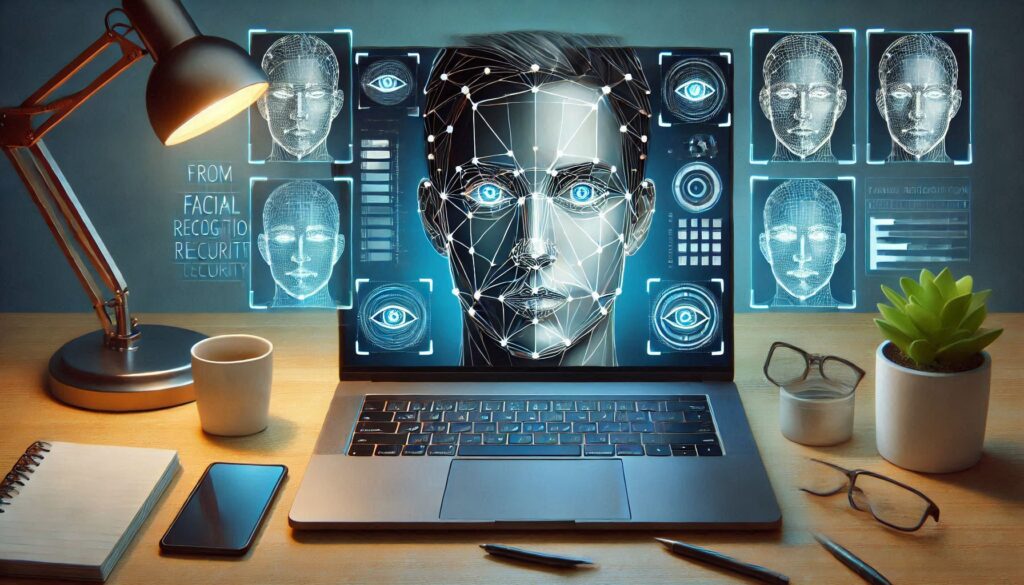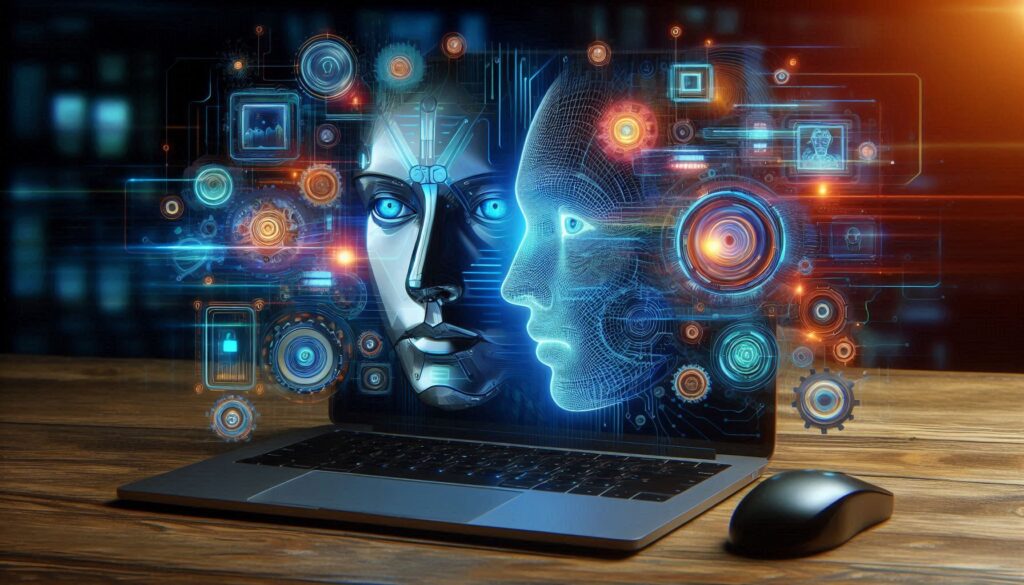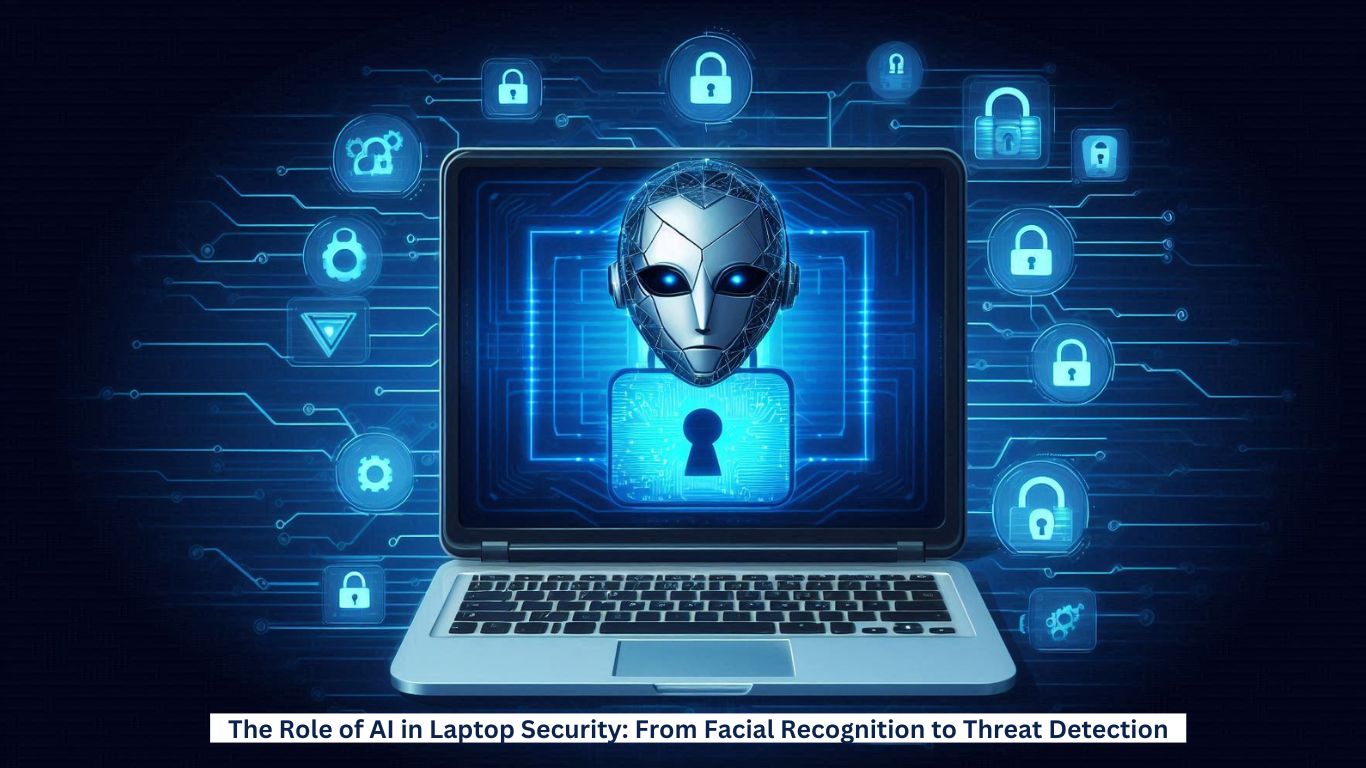The Role of AI in Laptop Security: From Facial Recognition to Threat Detection

The Role of AI in Laptop Security: From Facial Recognition to Threat Detection
The Role of AI in Laptop Security: From Facial Recognition to Threat Detection: In the rapidly evolving world of technology, ensuring laptop security has become a top priority for both individuals and organizations. The integration of artificial intelligence (AI) into security systems marks a transformative shift in the way we protect our devices and data. AI-powered laptop security encompasses a wide range of innovative technologies, from advanced facial recognition systems to proactive threat detection mechanisms, all designed to keep pace with modern cyber threats.
This article explores how AI is elevating the standards of secure laptops in 2025, its role in biometric authentication, and the benefits and challenges associated with its adoption. Let’s delve into how AI-powered intrusion detection laptops and other cutting-edge technologies are shaping the future.
The Need for Advanced Laptop Security
With the proliferation of cyberattacks and data breaches, traditional security measures such as passwords and firewalls are no longer sufficient. Hackers employ sophisticated techniques that can easily bypass conventional defenses. In 2025, the stakes are higher than ever, with sensitive personal and professional data stored on laptops.
The demand for secure laptops 2025 has led to the rise of AI-powered solutions. These technologies leverage machine learning, pattern recognition, and real-time analytics to offer enhanced protection against a variety of threats, including malware, phishing attempts, and unauthorized access.
AI-Powered Laptop Security: The Basics
Artificial intelligence adds an extra layer of intelligence and adaptability to laptop security systems. By analyzing vast amounts of data in real-time, AI systems can:
- Identify Anomalies: Detect unusual patterns in user behavior or system activities that may indicate a security threat.
- Predict Threats: Use predictive analytics to anticipate potential risks and mitigate them before they occur.
- Enhance User Authentication: Implement biometric methods such as facial recognition, fingerprint scanning, and voice recognition for secure and convenient access.
The Rise of Biometric Laptops
Biometric authentication has emerged as a cornerstone of modern laptop security. Unlike passwords or PINs, which can be guessed or stolen, biometric laptops with AI security leverage unique personal identifiers, making them significantly more secure.
Facial Recognition Technology
Facial recognition is perhaps the most widely adopted biometric technology in laptops today. AI algorithms analyze facial features, such as the distance between eyes or the shape of the jawline, to verify the user’s identity. The process involves:
- Image Capture: The laptop’s camera captures the user’s facial image.
- Feature Analysis: AI processes the image to extract and analyze facial features.
- Matching: The features are compared to a stored template to authenticate the user.
Key advancements in AI-enhanced facial recognition technology have addressed concerns like spoofing, where attackers use photos or videos to trick the system. Modern systems employ liveness detection to differentiate between real users and fake inputs.
Fingerprint Scanning
Fingerprint sensors have become commonplace in laptops. These devices use AI to analyze the unique patterns of ridges and valleys on a user’s fingertip. With AI-enhanced biometric authentication laptops, fingerprint recognition systems have improved accuracy and speed, reducing false positives and enhancing user experience.
Voice Recognition
Though less common than facial or fingerprint recognition, voice authentication is gaining traction. AI-driven voice recognition analyzes vocal patterns, tone, and pitch to identify users. This method is particularly useful in hands-free environments.
Threat Detection: AI’s Defensive Role
While biometric authentication secures access to laptops, AI also plays a crucial role in detecting and preventing cyber threats. Traditional antivirus software relies on signature-based detection, which requires known patterns of malware to be effective. In contrast, AI-powered intrusion detection laptops are proactive and adaptive.

Malware Detection
AI algorithms can identify malware by analyzing:
- Behavioral Patterns: Detecting unusual actions, such as unauthorized data access or changes to system files.
- Code Analysis: Recognizing malicious code structures that deviate from normal software patterns.
Phishing Prevention
Phishing attacks have become increasingly sophisticated, often bypassing traditional email filters. AI enhances phishing detection by:
- Scanning email content for suspicious language or links.
- Identifying fake websites designed to steal credentials.
- Monitoring user interactions with emails to flag unusual behavior.
Intrusion Detection
AI-powered intrusion detection systems monitor network traffic and system activity to detect unauthorized access. These systems employ
techniques like anomaly detection and machine learning to identify potential threats in real time.
Secure Laptops in 2025: Features and Trends
Laptops in 2025 are expected to feature a host of AI-driven security enhancements. Here are some notable trends:
- Zero-Trust Architecture
AI supports the implementation of zero-trust models, where devices constantly verify the identity and trustworthiness of users and applications. - Multi-Factor Authentication (MFA)
MFA is evolving with AI, combining biometrics with contextual factors such as location and device behavior for added security. - Edge AI for Privacy
Edge AI processes data locally on the device rather than relying on cloud servers, reducing latency and enhancing privacy. - Self-Healing Systems
AI enables laptops to detect and repair vulnerabilities autonomously, minimizing downtime and reducing the risk of exploitation.
Challenges and Ethical Considerations
Despite its benefits, the integration of AI in laptop security is not without challenges:
- Privacy Concerns
- The collection and storage of biometric data raise significant privacy issues. Ensuring that data is securely stored and not misused is critical.
- Bias in AI Systems
- AI algorithms may exhibit biases, leading to errors in authentication or threat detection. Continuous refinement and diverse datasets are needed to address this issue.
- Cost and Accessibility
- AI-driven security features may increase the cost of laptops, potentially limiting their accessibility to a wider audience.
- Dependence on AI
- Over-reliance on AI could lead to complacency, making users less vigilant about manual security practices.
The Future of AI-Powered Laptop Security
The future of AI in laptop security holds immense promise. As AI technology continues to advance, we can expect:
- Integration with IoT Ecosystems
- Laptops will seamlessly connect with other devices, sharing threat intelligence to create a unified security ecosystem.
- Advanced Behavioral Analysis
- AI will delve deeper into user behavior, identifying even subtle deviations that could indicate a breach.
- Personalized Security Protocols
- AI will tailor security measures based on individual user needs and risk profiles, providing a customized experience.
- Quantum-Resistant Algorithms
- With the advent of quantum computing, AI will play a key role in developing encryption methods resistant to quantum attacks.
Meta Description
Discover how AI-powered laptop security is revolutionizing device protection with facial recognition, biometric laptops, and advanced threat detection. Explore secure laptops for 2025.
Conclusion
AI is revolutionizing laptop security, offering innovative solutions to combat modern cyber threats. From facial recognition and biometric authentication to real-time threat detection, AI-powered laptop security systems are setting new benchmarks for safety and convenience. However, the journey is not without challenges, including privacy concerns, ethical dilemmas, and cost considerations.

As we move further into 2025 and beyond, the synergy between AI and security will continue to evolve, making secure laptops more robust and intelligent. By addressing the associated challenges and ensuring responsible AI deployment, we can unlock the full potential of AI-powered laptop security, paving the way for a safer digital future.

